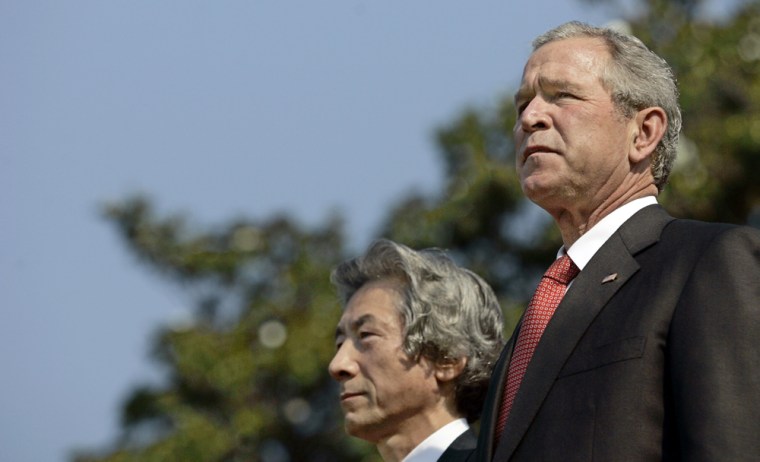Celebrating a close friendship, President Bush welcomed Japanese Prime Minister Junichiro Koizumi to the White House on Thursday as a strong ally in Iraq and Afghanistan and confronting North Korea about its nuclear weapons ambitions.
"Decades ago our two fathers looked across the Pacific and saw adversaries, uncertainty and war," Bush told the prime minister at an elaborate welcoming ceremony on the South Lawn. "Today their sons look across that same ocean and see friends and opportunity and peace."
Koizumi said there has been no other world leader besides Bush with whom he has felt so much "heart-to-heart" friendship and trust. Asserting Japan's desire to enhance its role as a world leader, Koizumi said he and Bush would discuss bilateral issues as well as global challenges.
"I sincerely hope that my visit this time will enable our two countries to continue to cooperate and develop together and, as allies in the international community, make even greater contributions to the numerous challenges in the world community," said Koizumi, who stopped to shake the hands of Japanese-American children who attend a Japanese language school in Washington.
Multi-faceted farewell visit
Bush will fete Koizumi with a gala official dinner Thursday. They will discuss reported North Korean preparations to test-launch a long-range missile and Japan's support for the U.S. fight against terror. That is all standard fare for the leaders of major allies. The best indicator of how Bush feels about Koizumi will come after the policy discussions and formal gatherings end, when the president treats Koizumi to a tour Friday of the home of the prime minister's musical hero, Elvis Presley.
"Officially he's here to see the president but I know the highlight of his visit will be paying his respects to the king," Bush said jokingly.
It is a farewell tour for Koizumi before he steps down in September. The prime minister is a stalwart member of a dwindling group of world leaders willing to stand by the beleaguered president as bloodshed continues in Iraq and anger soars over U.S. foreign policy.
Hundreds of guests on the South Lawn waved miniature Japanese and American flags on a clear but muggy summer morning. Amid trumpet fanfares, canon fire and drum rolls, the prime minister arrived at the White House in a limousine with darkened windows and was greeted by the president and his wife, Laura.
Members of a military color guard also carried flags of the two countries and paraded in time to a march played by a military band. Some of the flags got snagged briefly on a magnolia tree next to the Truman Balcony. In full dress uniform, ranks of servicemen and women from all branches filed in across the South Lawn and faced the dignitaries.
World leaders' bond
"The friendship between our two nations is based on common values," Bush said. "These values include democracy, free enterprise and a deep and abiding respect for human rights."
"These values are under attack by terrorist networks that bring death and destruction to all who oppose their hateful ideology," the president said. "So the United States and Japan are working together to defend our shared values and win the war on terror."
Koizumi is seen as having changed the way Japan views itself on the world stage. Japanese troops, once viewed as colonizing aggressors, now stand ready to take a bigger role in regional and global security.
The leaders' close ties are said to have been forged in the aftermath of the Sept. 11, 2001, terror attacks.
Koizumi changes Japan
Koizumi then began working to transform Japanese foreign policy, often in the face of opposition from those who felt a strong connection with the United States could make Japan a target of terrorists.
Japan's post-World War II constitution prohibits its military from combat duty in international conflicts. But the country enacted a law after the Sept. 11 attacks to let Japan provide logistical support to coalition forces in the U.S.-led anti-terrorism campaign in Afghanistan.
Under another Koizumi law, passed in 2003, Japan was able to send about 600 troops to southern Iraq on a noncombat humanitarian mission. When Tokyo said last week it was withdrawing its ground troops, Koizumi made sure to note the decision was made in consultation with the United States.
U.S.-Japan ties
The United States also relies on Japanese cooperation in Asia. The two countries are part of five-nation efforts to persuade North Korea to abandon its nuclear weapons program. Tokyo and Washington recently signed an agreement to expand their cooperation on a joint ballistic missile defense shield.
Japan also showed both its growing strength and the importance it gives its alliance with the United States when the two countries hammered out the biggest restructuring in decades of the U.S. military in Japan.
The plan will relocate airfields and aircraft and transfer thousands of U.S. Marines from Okinawa to Guam in an effort to ease tensions with Japanese who have long complained about crime, accidents, land use and noise associated with U.S. forces.
Still, officials took care to note that the U.S.-Japanese alliance is "the indispensable foundation of Japan's security ... and the linchpin of American security policy in the region."
White House officials say the trip to Graceland was Bush's idea, a final public tribute to a friendship that Bush has often described to American audiences.
